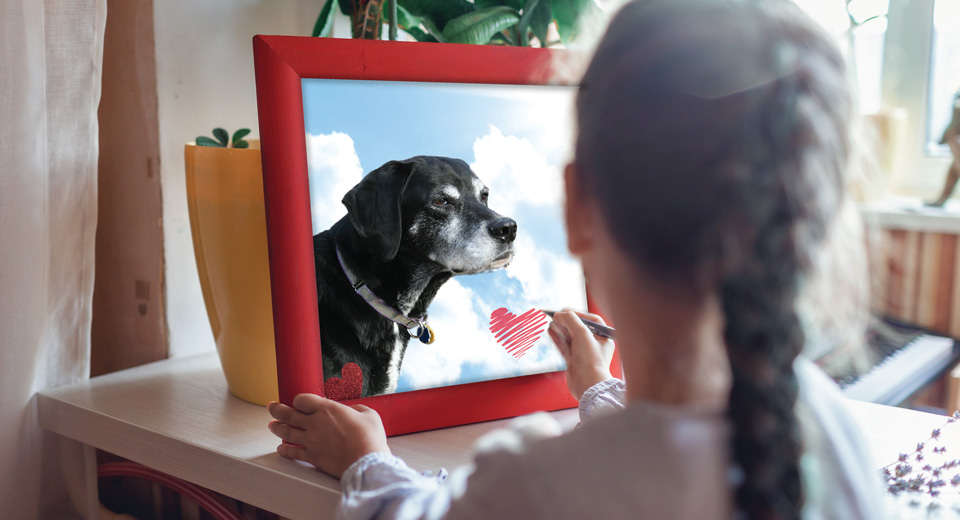
Navigating the Emotional Journey of Pet Loss
The loss of a pet is an emotional, often heart-wrenching experience, marking the end of a cherished bond shared between humans and their animal companions. This chapter introduces the profound impact of pet loss, delving into the unique challenges and emotions it evokes. We will explore the deep connection between humans and their pets and set the stage for discussing how to cope with this difficult experience.
Understanding the Depth of Pet Loss
For many, pets are not just animals but beloved members of the family. Their loss can trigger a wave of grief as intense as the loss of a human loved one. This chapter acknowledges the complexity of emotions involved in pet loss, from profound sadness and loneliness to confusion and sometimes guilt.
The Human-Pet Bond
The bond between humans and their pets is unique and profound. Pets offer unconditional love, companionship, and often a sense of purpose to their human counterparts. They become integral to our daily routines, our joys, and our struggles. The loss of such a companion leaves a significant void, and understanding this bond is essential to recognizing why the grief is so deep.
Preview of Key Aspects
In the following sections, we will explore various aspects of coping with pet loss:
Stages of Grief: Understanding the different stages of grief and recognizing that everyone’s journey is personal and unique.
Healthy Coping Mechanisms: Tips and strategies for navigating through the grief, including self-care, support systems, and remembering and celebrating the life of your pet.
When to Seek Professional Help: Recognizing when grief is overwhelming and the importance of seeking professional help or counseling.
Supporting Others in Grief: How to support friends or family members who are dealing with the loss of a pet.
The Grief of Saying Goodbye
The Universal Experience of Grief in Losing a Pet
Losing a pet is a universally heartbreaking experience for pet owners. For many, pets are not just animals; they are family members, companions, and sources of unconditional love and support. The bond shared with a pet is unique and profound, and its loss can trigger an intense grieving process. This chapter acknowledges that grief is a natural and expected response to such a loss, emphasizing that it is a testament to the deep connection shared with the pet.
Emotions and Stages of Grief for Pet Owners
Grieving the loss of a pet often involves a range of emotions and stages, akin to grieving the loss of a human loved one. Pet owners may experience denial, anger, bargaining, depression, and acceptance, though not necessarily in that order or within a set timeframe. The intensity and duration of these emotions can vary greatly among individuals. Some may experience overwhelming sadness, while others might struggle with guilt or loneliness. It’s important to understand that all these emotions are normal and part of the healing process.
Acknowledging and Processing Feelings
The importance of acknowledging and processing one’s feelings during this time cannot be overstated. Suppressing or ignoring grief can hinder the healing process. This chapter encourages individuals to express their emotions, whether it’s through crying, talking with friends or family, or participating in a support group. Remembering and celebrating the life of the pet can also be a therapeutic part of the grieving process. Memorializing a pet, whether through a small ceremony, a photo album, or a written tribute, can help in honoring their memory and the joy they brought.
Remembering Your Beloved Companion
The Significance of Cherishing Memories
Losing a pet is a deeply personal and profound experience. Pets are not just animals; they are cherished members of our families, companions who bring joy, comfort, and love into our lives. Remembering and celebrating their life is a crucial part of the grieving process. It helps in acknowledging the bond you shared and the impact they had on your life. Cherishing these memories allows us to keep a part of our beloved pets with us, honoring their existence and the happiness they brought.
Creating a Meaningful Tribute
Memorial Spaces: Create a special spot in your home or garden dedicated to your pet. This could be a small garden with their favorite flowers, a framed photograph, or a custom-engraved stone.
Keepsakes: Keepsakes such as a paw print cast, a lock of fur, or a custom piece of jewelry can be a comforting way to keep your pet’s memory close.
Photo Albums or Memory Boxes: Compile a photo album or a memory box filled with photos, their favorite dog toys, or other items that remind you of the happy times shared.
Donate or Volunteer: Honor your pet’s memory by donating to an animal shelter or volunteering. Helping animals in need can be a beautiful way to pay tribute to the love you received from your pet.
The Healing Power of Storytelling
Sharing stories about your pet can be incredibly healing. Whether it’s recounting their quirky habits, special moments you shared, or simply talking about what they meant to you, storytelling keeps their memory alive. It allows you to express your feelings and connect with others who understand the depth of your loss. These anecdotes can bring smiles and laughter, helping to balance the grief with positive remembrance.

Coping Strategies for Pet Loss
Finding Comfort and Healing in the Wake of a Beloved Pet’s Departure
Coping with the loss of a pet is a deeply personal journey, often marked by profound grief and sadness. In this section, we offer practical tips and strategies to help navigate through this difficult period. Seeking support, engaging in self-care, and recognizing when professional help is needed are key steps in the healing process.
Seeking Support
Friends and Family: Don’t hesitate to reach out to friends and family members, especially those who understand the significance of your loss. Sharing memories of your pet can be a comforting way to honor them and express your feelings.
Pet Loss Support Groups: Consider joining a pet loss support group. These groups provide a safe space to share your experience with others who have gone through similar losses. They can offer empathy, understanding, and coping strategies.
Online Communities: If you prefer not to attend in-person meetings, online forums and social media groups can also be a source of support and comfort.
Engaging in Self-Care
Maintain Routine: Try to maintain your daily routine as much as possible. This can provide a sense of normalcy and structure during a tumultuous emotional time.
Physical Activity: Engage in physical activities like walking, jogging, or yoga. Exercise can help manage stress and improve mood by releasing endorphins.
Creative Expression: Channel your emotions into creative outlets such as writing, painting, or music. Creating a memorial piece for your pet can be a therapeutic way to honor their memory.
Allow Yourself to Grieve: Give yourself permission to grieve. Everyone processes loss differently, and there is no “right way” to feel after losing a pet.
Professional Help
Recognizing the Need: If your grief is overwhelming or interfering with your ability to function in daily life, it might be time to seek professional help.
Pet Loss Counseling: Therapists specializing in pet loss can provide targeted guidance and support. They can help you navigate your emotions and develop coping strategies.
General Therapy: General therapy sessions can also be beneficial, particularly if the pet’s loss triggers other emotional issues or past grief.
Embracing the Journey of Grief and Remembrance
As we conclude this exploration into the emotional landscape of pet loss, it’s important to revisit the key points that have been discussed, and to offer a message of support and hope to those navigating this challenging experience.
Acknowledging Grief
The loss of a pet is a profound and significant event, and the grief that accompanies it is both real and valid. Recognizing and accepting these feelings is a critical step in the healing process. Grief is a testament to the deep bond shared with a pet, and it’s essential to allow yourself the space and time to mourn.
Cherishing Memories
While the pain of loss is acute, it’s equally important to remember and celebrate the joy and love your pet brought into your life. Cherishing the memories you shared can provide comfort and a sense of continuity, helping to keep your beloved pet’s spirit alive in your heart.
Hope for Healing and Renewal
Healing from pet loss is a gradual process and varies from person to person. It’s a journey of finding balance between mourning the loss and embracing the joy of the memories. With time, the sharpness of grief softens, making way for a renewed sense of peace and gratitude.
A Message of Support
To those who have lost a beloved pet, know that you are not alone in your grief. There is a community of individuals who understand and share in your pain. Your feelings are valid, your loss is significant, and your journey towards healing is respected.
Encouraging Community Support
Readers are encouraged to share their own experiences and coping strategies in the comments section. By doing so, we can foster a supportive community where individuals can find solace and understanding. Sharing your story may not only be cathartic for you but can also provide comfort and guidance to others in similar situations.
Final Thoughts
In closing, remember that the love shared with a pet is never lost. It transforms into lasting memories that continue to bring warmth and comfort. While the journey of grief is deeply personal, you are surrounded by a community ready to support and uplift you. May you find peace, healing, and a renewed sense of love as you remember your cherished companion.
